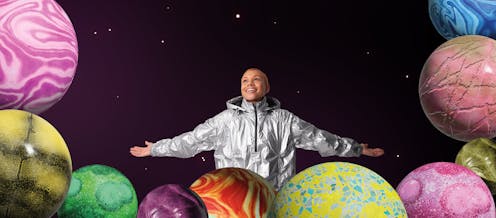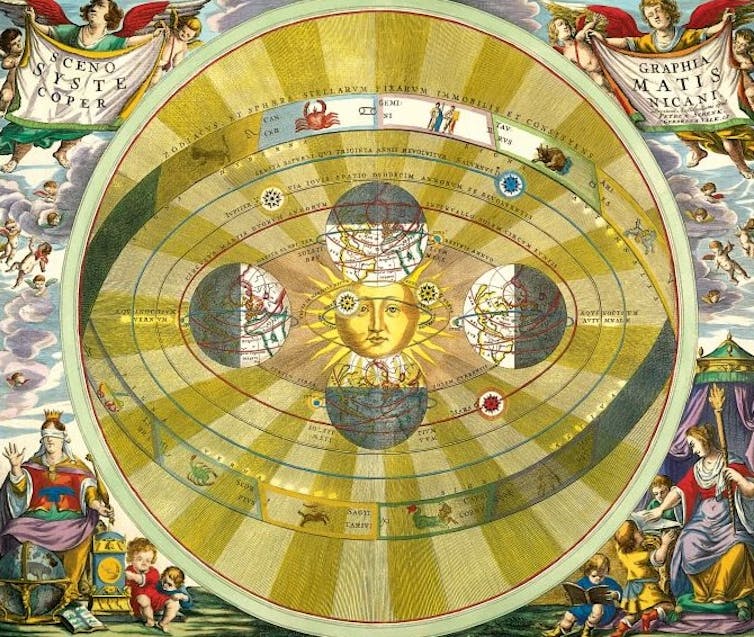Astrology’s appeal in uncertain times
- Astrology’s appeal in uncertain times can be attributed to its ability to provide a sense of control and guidance in an uncertain world, particularly among younger generations and LGBTQ+ individuals.
- The study found that astrology is less about predicting the future and more about making sense of the self, with many respondents using it as a tool for understanding their personality or navigating major life choices.
- Astrology’s popularity reflects broader cultural shifts, including the decline of traditional sources of authority and the rise of spirituality and identity categories.
- The study suggests that astrology offers people tools for navigating uncertainties, such as providing a language for identity, offering measures of control, and creating community, particularly among LGBTQ+ individuals.
- Despite being dismissed as irrational or pseudoscientific, astrology’s popularity can be seen as a reflection of contemporary life, with many people treating it as a tool that straddles categories between spirituality, cultural practice, entertainment, and language for understanding themselves and others.

Scroll through TikTok, browse dating profiles or sit at a cafe, and you’ll often hear people reference their astrological sign. Someone might proudly claim their Leo energy; others joke that they would never date a Scorpio.
Even in modern societies shaped by science, technology and universities — what sociologists sometimes call “disenchantment” — many people are still looking to astrology for meaning.
Its widespread popularity sits alongside skepticism, with surveys suggesting that astrology can be popular even among those who don’t fully “believe” in it and use it “for fun.”
In a new study published in the sociology journal Social Currents, we examined who consults astrology, how they use it and why they’re drawn to it.
Drawing on nationally representative surveys, interviews with Americans and conversations with professional astrologers, we found that astrology is less about predicting the future and more about making sense of the self in an uncertain world.
Astrology’s deep roots
Astrology – the idea that the positions and movements of the Sun, Moon, planets and stars influence events on Earth – has a long history.
For centuries, it was closely linked with astronomy. Early astronomers were also astrologers, charting the stars to measure time and interpret their influence on human life. The familiar 12-sign zodiac dates back to the fifth century B.C.E., and astrology was taught in medieval universities.

Buyenlarge/Getty Images
Astronomy and astrology began to diverge in the 17th century. As astronomy embraced mathematics and observation during the Scientific Revolution, astrology increasingly lost its scholarly legitimacy and was pushed to the margins.
By the 19th century, science itself became professionalized. Universities and academies formalized disciplines, research careers and standards of evidence. With astronomy firmly established as a science, astrology was relegated to the realm of the occult or pseudoscience.
Astrology entered mainstream culture in the 1930s with daily newspaper horoscopes and spread widely, before experiencing renewed popularity in the 1960s and 1970s thanks to the New Age movement.
Astrology’s current digital resurgence echoes these earlier waves, showing how it has repeatedly adapted to cultural shifts. Among Gen Zers, downloads of astrology apps have spiked in recent years, and industry reports project the global astrology market will top US$22 billion by 2031.
Who’s turning to astrology
Astrology today is far from fringe.
Roughly one-quarter of Americans say they believe in astrology, according to a June 2025 Gallup survey. A May 2025 Pew Research poll found that close to one-third of Americans say they’ve consulted horoscopes or similar tools.
In our analysis, just under half of Americans reported ever having consulted a horoscope. We also found that women, younger adults and LGBTQ+ people were especially likely to look to the stars for guidance.
More than half of women said they had read a horoscope, compared with slightly more than one-third of men. About 60% of sexual minorities reported doing so, compared with just under half of heterosexuals. Younger adults were consistently more likely than older adults to read or consult astrology.
Its popularity reflects broader cultural shifts: Younger generations are less tied to organized religion but continue to seek out spirituality or find meaning in other places.
In our study, we draw on data from interviews with 31 Americans, who shared that they saw astrology as a form of entertainment or as a window into someone’s personality.
Many respondents could name their zodiac sign or sun sign, and some described how it seemed to “fit” their personality. Few saw astrology as literally predictive. Instead, they used it as one more way to understand the self, comparable to tools such as the Myers-Briggs personality test or the enneagram.
Our co-author, independent researcher Avantaea Siefke, interviewed professional astrologers and their clients, who framed astrology differently. For them, it was less about labels and more about spirituality and decision-making. They described astrology as a way to time major choices, gain confidence or reflect on relationships. One astrologer likened it to therapy: not deterministic, but a source of guidance and assurance.
Astrology in uncertain times
Why does astrology resonate now?
Some analysts have described the current moment as an “age of polycrisis,” with overlapping economic, political and environmental challenges. At the same time, identity categories have become more fluid, and traditional sources of authority — religion, education, government — are more likely to be contested or distrusted.
Astrology may offer people tools for navigating these uncertainties.
It provides a language for identity, giving people shorthand to describe themselves and others. It offers a measure of control by giving people frameworks for thinking about choices and timing. And it creates community, particularly for LGBTQ+ people. Scholars have noted that astrology is a way for queer communities to cope with everyday struggles and imagine alternatives to mainstream forms of care and healing.
Critics often dismiss astrology as irrational or pseudoscientific, and it’s true that astrology is not a science. But rather than asking whether astrology is “real,” it may be more useful to ask what its popularity says about contemporary life.
From a sociological perspective, astrology is fascinating precisely because it straddles categories. Rather than a set of cosmic beliefs, many people treat astrology as a tool — part spirituality, part cultural practice, part entertainment and part language for understanding themselves and others.
It is probably no coincidence that astrology often surges during unsettled times.
Just as earlier generations might have turned to prayer or ritual, many people today turn to the stars. And while astrology may not predict the future, its popularity says a great deal about how Americans are navigating the present.
Independent researcher Avantaea Siefke is a contributing author of this article.
![]()
Shiri Noy has received funding from the National Science Foundation and from sub-grants funded by the Templeton Religion Trust and the Issachar Fund.
Christopher P. Scheitle receives funding from the National Science Foundation and the John Templeton Foundation. The research discussed in this article was supported by a grant from the Science and Religion: Identity and Belief Formation grant initiative spearheaded by the Religion and Public Life Program at Rice University and the University of California-San Diego and provided by the Templeton Religion Trust via The Issachar Fund.
Katie E. Corcoran receives funding from the National Science Foundation, the John Templeton Foundation, and the Patient-Centered Outcomes Research Institute. The research discussed in this article was supported by a grant from the Science and Religion: Identity and Belief Formation grant initiative spearheaded by the Religion and Public Life Program at Rice University and the University of California-San Diego and provided by the Templeton Religion Trust via The Issachar Fund.
